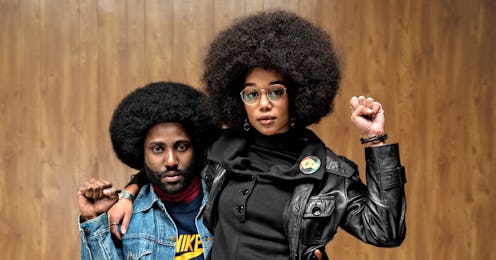Entertainment
Laura Harrier's 'BlacKkKlansmen' Character Was Based On Such Incredible Women
Spike Lee's BlacKkKlansman tells the audacious story of a black police detective infiltrating the the Ku Klux Klan in the '70s. While that might sound unbelievable, the film is an autobiographical story based on the life of Ron Stallworth (John David Washington), the first black officer in the Colorado Springs Police Department. In the film, as Stallworth gathers information on the notorious hate group, he begins a relationship with Patrice Dumas, a student activist at a nearby college. But was Patrice from BlacKkKlansman a real person in Stallworth's life?
The on-screen version of Stallworth's story of nearly becoming the first black chapter leader of a white power organization is mostly true, but Lee did take some liberties. In the film, when Stallworth goes out on his first undercover assignment to observe and report on a Stokely Carmichael speech in Colorado, he is intrigued by student organizer Patrice Dumas (Laura Harrier). Soon after, Stallworth replies to a KKK ad in a local newspaper using his real name (a major no-no for undercover work), and ends up talking to the local chapter head. He teams up with Jewish partner Flip (Adam Driver) for IRL meetings, and the two begin infiltrating the organization as Stallworth's relationship with Dumas develops.
So what's really real? First, not much is known about Flip, as his actual identity remains a mystery; Lee's decision to make him Jewish was simply to give Flip some "skin in the game" when it came to direct Klan hatred. And though Stallworth is now happily married (to his high school sweetheart, no less) no such person as Black Student Union Leader Patrice Dumas actually existed in his life. But the speech that led to their encounter really was Stallworth's first undercover assignment, and Dumas is heavily based on real-world women in the Black Power movement.
Angela Davis was an obvious inspiration, as the prominent countercultural leader was briefly involved with both the Communist and Black Panther parties, and spent a lifetime writing and speaking out on feminism, black power, social organization, and the prison-industrial complex. In an interview with Fashionista, BlacKkKlansman costume designer Marci Rogers referred to Davis, who became Professor Emeritus at UC Santa Cruz, as well as Kathleen Cleaver, currently senior lecturer at Emory University School of Law, as beng direct inspirations for Dumas' look and attitude.
Cleaver was also a student organizer, who after meeting the Black Panther's minister of information Eldridge Cleaver, joined the Panthers herself and moved to San Francisco. She became their communications secretary, spokesperson, and press secretary, fleeing the United States after numerous police raids and investigations, eventually returning in the mid-'70s. Talking to Who What Wear about Cleaver, actor Laura Harrier said, "It really struck me how young she was when she was a pivotal member of the Black Panther Party and how she didn’t set out to be this huge famous figure."
Though the character is fictional, what she represents on screen was important to Harris. Said the actor, “[Dumas] was able to be this strong, badass, revolutionary woman while being in love with a man and having a relationship.” She added that Dumas also reflects the “non-famous woman of the Black Power Movement,” including Harrier’s own family members. She may not be an actual person, but the women Patrice Dumas represents were vital to the time BlacKkKlansman is set.
Editor's Note: an earlier version of this piece incorrectly referred to the character Flip as Chip.
